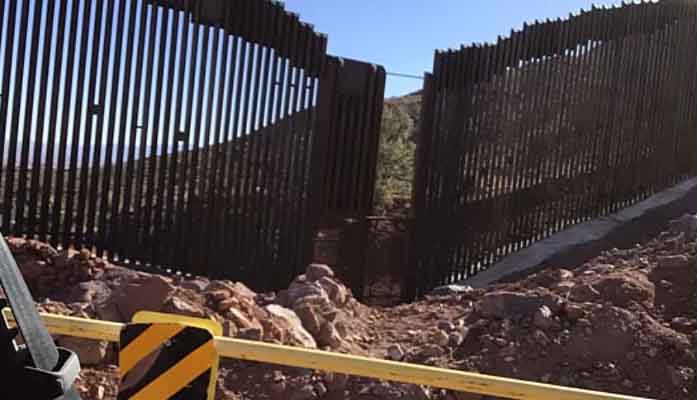
by Corinne Murdock | Jul 31, 2022 | News
By Corinne Murdock |
On Thursday, the Department of Homeland Security (DHS) announced it would close preexisting border wall gaps, but only after ensuring environmental stewardship. This is continuation of a departmental practice dating back well over a decade, one DHS hasn’t expedited or circumvented despite the ongoing border crisis. If DHS maintains similar pace from recent environmental stewardship reviews, it may be well over a year before these gaps are addressed.
The four gaps addressed will be along the incomplete border section in Border Patrol’s Yuma Sector.
The environmental stewardship in question has been a DHS goal since 2008, when Customs and Border Patrol (CBP) introduced an Environmental Stewardship Plan (ESP) and a Biological Resources Plan (BRP) to analyze the potential environmental impacts of border security construction, or tactical infrastructure (TI). Present protocol requires the development of an ESP before commencing the project. One of the latest ESPs was issued in November 2020 for construction announced in May 2019.
Included within an ESP are recommended construction practices to mitigate potential environmental impacts, or Best Management Practices (BMP) and Conservation Measures (CM).
Past DHS reports on environmental stewardship ultimately concluded that the positives of a border wall preventing foot traffic from illegal crossings, thereby preserving natural habitats and species, outlasted the negatives of construction.
Aspects of an ESP include factoring the biological and geographical conditions of the area, such as the vegetation and wildlife that would be impacted by construction efforts. Environmental stewardship also factors in cultural resources such as archaeological discoveries. (If artifacts are discovered, all work halts until an archaeologist clears officials to resume work).
The November 2020 ESP concerned 15 miles of fence replacement along the California border considered air quality; noise; land use, recreation, and aesthetics; geological resources and soils; groundwater; surface waters and other bodies of water; floodplains; vegetation; wildlife and aquatic resources; protected species and critical habitat; cultural resources; socioeconomics; and hazardous materials and waste.
Some of the ESP’s recommended BMP and CM included: wetting the soil to suppress dust, capping speed limits at 25 mph on unpaved roads, muffling equipment like generators, migratory bird surveillance and relocation, and cleaning of construction equipment (to prevent spread of non-native species).
Following completion of the border construction, DHS issues an Environmental Stewardship Summary Report (ESSR).
Another impediment for immediate border wall gap sealing comes from DHS obligations to engage with stakeholders.
Funding for the border wall gap closures will come from DHS fiscal year 2021 appropriations.
Corinne Murdock is a reporter for AZ Free News. Follow her latest on Twitter, or email tips to corinne@azfreenews.com.

by Corinne Murdock | Jul 30, 2022 | News
By Corinne Murdock |
Governor Doug Ducey criticized Washington, D.C. Mayor Muriel Bowser’s request for National Guard troops to mitigate about 4,000 migrants in her city, noting that Arizona bears a far greater burden and that her party could solve the root cause. Since January, there have been over 1.4 million encounters along the southwest border; that’s well over 3.2 million encounters since President Joe Biden took office.
Ducey noted that Arizona endured just shy of 43,600 border encounters in June — not including the far-greater estimates of “gotaways,” or those illegal crossers spotted but not apprehended.
The governor noted that the Biden administration hasn’t declared a national emergency over the border crisis. Ducey issued a state of emergency last April. He also recounted how Arizona used its own state resources to deploy its own National Guard troops to handle the mass border invasion.
Ducey has consistently accused Democratic leadership of failing to take action. He advised Bowser that her plea for troops was only a temporary solution to a problem that her party could solve.
“Mayor Bowser is right. This is a humanitarian crisis. Yet her allies in the White House and Congress refuse to act,” stated Ducey. “If the Mayor really wants to address the issue, she can join us in calling for President Biden to take action at the root of the problem, and secure our southern border.”
AZ Free News reported earlier this month that the Border Patrol (BP) Yuma Sector reported over 235,000 encounters — a 300 percent increase from this same time last year. Nationwide, that number grew to over 1.7 million encounters this fiscal year, October to June.
In May, the Arizona House Republican caucus submitted a legislative proclamation denouncing the current state of the border. The proclamation exhorted President Joe Biden’s administration to act.
Both of Arizona’s Democratic Senators, Mark Kelly and Kyrsten Sinema, took action to mitigate the illegal crossings. The pair announced in March that they secured budget provisions to increase border security, though none were allocated to finishing the border wall.
Corinne Murdock is a reporter for AZ Free News. Follow her latest on Twitter, or email tips to corinne@azfreenews.com.

by Corinne Murdock | Jul 29, 2022 | News
By Corinne Murdock |
The Maricopa County Elections Department will swap Sharpies for Pentel felt-tipped pens to ensure that the ink dries fast enough for tabulation machines to process in-person votes.
Maricopa County Recorder Stephen Richer told AZ Family this week that Sharpies don’t dry as quickly as Pentel pens.
“If you’re voting on Election Day, we need that pen to dry quickly because you’re going to feed it directly into the tabulation machine that is there at the voting location,” Richer said.
The county’s switch comes months ahead of the two-year anniversary of “SharpieGate,” a viral belief that grew out of local voter complaints in the 2020 election that Sharpies used at voting locations to fill out ballots caused tabulation machines to struggle processing their ballots.
In May, Richer shared with KTAR News that SharpieGate-related concerns among voters were another reason they ceased using Sharpies.
“It’s small but emblematic of what we’re trying to do here,” said Richer.
Yet in June, Maricopa County Board of Supervisors Vice Chairman Clint Hickman said in a since-deleted interview with AZ Family that Sharpies were the manufacturer-recommended tool because of their quick drying time.
“Sharpies are recommended by the manufacturer because they provide the fastest-drying ink. The offset columns on ballots ensure that any bleed-through will not impact your vote,” said Hickman.
In the weeks following 2020 voters’ concerns that Sharpie ink invalidated ballots, Maricopa County asserted that Sharpies didn’t compromise ballot integrity and were “the best option” for their tabulation equipment. They also claimed that Sharpies were the “fastest drying ink” that “doesn’t smudge.”
The county added that the tabulation machine manufacturers recommended the use of Sharpies over other writing instruments.
Richer pleaded with voters to use the felt-tipped pens, saying that other pens — like ballpoint — might cause residue buildup in the tabulating machines.
The changes prompted some within GOP leadership to openly balk county protocols. Arizona Republican Party Chairwoman Kelli Ward instructed her voters to use their own pens when voting.
State Representative and secretary of state candidate Shawnna Bolick (R-Phoenix) announced that she would be using her own pen to vote in person.
Bolick later shared that poll workers were giving her reports of the pens bleeding through the ballots. The county has assured voters repeatedly over the past two years that bleed-through doesn’t affect the machines’ ability to read ballots.
In response, Richer said that naysayers of the new pens were attempting to disrupt the primary. He advised voters to comply with their election workers by using whatever pen they’re given.
“It’s a primary. What the heck do you think we get out of giving people a special pen other than a smooth functioning election?” asked Richer. “Do you think we’re just asking you to use the Pentel pen to be funny? Good lord people.”
Primary Election Day is next Tuesday, August 2. Maricopa County drop box and voting locations are available online, and ballot tracking is available here.
Corinne Murdock is a reporter for AZ Free News. Follow her latest on Twitter, or email tips to corinne@azfreenews.com.

by Corinne Murdock | Jul 29, 2022 | News
By Corinne Murdock |
On Wednesday, Attorney General Mark Brnovich announced a lawsuit against the Biden administration for regulations treating unfinished, non-functional firearm parts as complete firearms.
Brnovich led a 17-state coalition lawsuit against the Bureau of Alcohol, Tobacco, Firearms, and Explosives (ATF) and the Department of Justice (DOJ) for the new regulations. In a press release, Brnovich said that the Biden administration was undermining American tradition on private firearm manufacturing.
“The ATF is attempting to overshoot the authority granted to it by Congress,” stated Brnovich. “The rulemakings are unconstitutional, impractical, and would likely put a large number of parts manufacturers out of business.”
The lawsuit addressed the ATF’s final rule, “Definition of ‘Frame or Receiver’ and Identification of Firearms,” issued in April. The ATF claimed in these updated guidelines that past definitions didn’t adequately describe modern frames and receivers. Accordingly, those definitions were untenable when seeking to regulate firearm parts used to assemble privately made firearms (PMFs), colloquially termed “ghost guns.” Therefore, the ATF argued, the definition of frames and receivers should include firearm parts and their variants.
The final rule will go into effect on August 24. The agency added that they will publish an additional final rule, which they characterized as a “stabilizing brace” to their guidelines, in December.
In the 168-page complaint, Brnovich asserted that the Biden administration regulations were “arbitrary, capricious, [and an] abuse of discretion” that violated multiple federal laws as well as the Constitution’s separation of powers, Fifth Amendment, Second Amendment, and First Amendment.
At the helm of the complaint are Gun Owners of America (GOA) and Gun Owners Foundation (GOF), affiliate nonprofits owned by North Dakota resident Eliezer Jimenez, and Morehouse Enterprises doing business as Bridge City Ordnance, a firearms dealer. The lawsuit insisted that the regulations would incur “ever encroaching, illegal, and unconstitutional infringements of their right to keep and bear arms.” It predicted that firearms dealers would be required to keep illegal records of privately-made firearms, and restructure their businesses entirely.
Joining Arizona are West Virginia, Alaska, Arkansas, Idaho, Indiana, Kansas, Kentucky, Louisiana, Missouri, Montana, Nebraska, Oklahoma, South Carolina, Texas, Utah, and Wyoming.
Corinne Murdock is a reporter for AZ Free News. Follow her latest on Twitter, or email tips to corinne@azfreenews.com.

by Corinne Murdock | Jul 28, 2022 | Education, News
By Corinne Murdock |
On Tuesday, Arizona Attorney General Mark Brnovich sued the U.S. Department of Agriculture (USDA) for requiring schools to adopt gender ideology practices in order to receive free or reduced lunch funds. About half of Arizona’s children rely on those meals.
The federal government supplements states with funds to provide free or reduced meals for low-income K-12 students. As AZ Free News reported, the Biden administration updated its Food and Nutrition Service (FNS) guidelines for its Supplemental Nutrition Assistance Program (SNAP) to clarify that protected classes within anti-discrimination policy included sexual orientation and gender identity. In the context of Biden’s correlating executive order, the guidelines would likely require schools to allow bathrooms, locker rooms, and sports teams open to gender identity.
Brnovich asserted in a press release that the Biden administration’s actions are unlawful.
“USDA Choice applies to beef at the market, not to our children’s restrooms,” said Brnovich. “This threat of the Biden administration to withhold nutritional assistance for students whose schools do not submit to its extreme agenda is unlawful and despicable.”
Arizona’s lawsuit is part of a 22-state coalition led by Tennessee Attorney General Herbert Slatery. The remainder of the coalition includes Indiana, Alabama, Alaska, Arkansas, Georgia, Kansas, Kentucky, Louisiana, Mississippi, Missouri, Montana, Nebraska, Ohio, Oklahoma, South Carolina, South Dakota, Texas, Utah, Virginia, and West Virginia.
Altogether, the 22 states receive over $28.6 billion in SNAP benefits for over 15.4 million individuals.
The states’ complaint asserted that President Joe Biden directed federal agencies to rewrite federal law in order to align with his January 2021 executive order to “prevent and combat discrimination on the basis of gender identity.” The lawsuit further asserted that the USDA circumvented the mandatory legal process outlined in the Administrative Procedure Act (APA) to implement their new guidelines.
The states described the new guidelines as “arbitrary, capricious, [and] an abuse of discretion.” Specifically, their lawsuit alleged that the Biden administration failed to observe procedures required by law for guideline updates, misinterpreted Title IX, violated anti-commandeering and non-delegation doctrines, and violated the Constitution’s Spending Clause, First Amendment, Tenth Amendment, and separation of powers.
“To be clear, the States do not deny benefits based on a household member’s sexual orientation or gender identity. But the States do challenge the unlawful and unnecessary new obligations and liabilities that the Memoranda and Final Rule attempt to impose — obligations that apparently stretch as far as ending sex-separated living facilities and athletics and mandating the use of biologically inaccurate preferred pronouns,” read the complaint. “Collectively, the Memoranda and Final Rule inappropriately expand the law far beyond what statutory text, regulatory requirements, judicial precedent, and the U.S. Constitution permit.”
Brnovich’s decision to join the coalition lawsuit wasn’t the only action Arizona officials took in response to the USDA guidelines. Earlier this month, Congresswoman Debbie Lesko (R-AZ-08) introduced legislation to nullify the gender ideology compliance requirement.
Corinne Murdock is a reporter for AZ Free News. Follow her latest on Twitter, or email tips to corinne@azfreenews.com.





